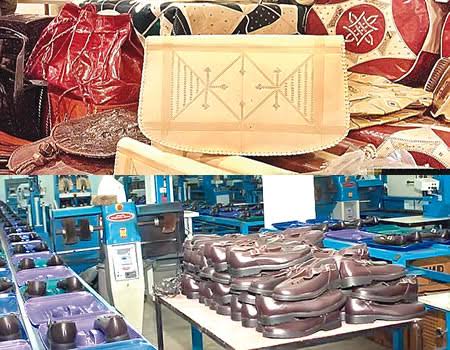Permanent Secretary, Nigeria’s Ministry of Science and Technology, Mr Bitrus Nabasu, has said it has plans to develop a National Leather Product Policy to boost Gross Domestic Product of the country.
Nabasu said this during the graduation ceremony of Internally Displaced Persons (IDP) trainees from Borno, trained by the Nigerian Institute of Leather and Science Technology (NILEST), Zaria in collaboration with the UNDP.
The IDPs were trained at NILEST, Zaria while their graduation ceremony was held at the FCT Agency for Science and Technology, Abuja.
Nabasu said the leather policy amongst others would establish manufacturing, importation and exportation principles that would checkmate certain operations and regulate stakeholders activities within the industry.
He disclosed that leather and leather products’ transaction were estimated to have increased in excess of N450 billion naira for footwear and N200 billion for other finished leather products.
He said the average exported value on leather and leather products stood between N189 billion and N252 billion respectively.
“The sad truth about the development is that 90 per cent of the benefit goes to foreign countries while the country benefits only 10 per cent.
“Ministry of Science and Technology and NILEST is making frantic efforts to reverse the ugly trend of huge capital flight by putting together, first ever stand alone national leather policy in Nigeria.
“The leather industry forms one of the vibrant sectors in national economic development, contributing enormously to Gross Domestic Product (GDP) of the country,”. Nabasu said.
He noted that the leather industry was viable at all points along the value chains and would be a lucrative business venture for the graduands.
Nabasu urged the graduands to make maximum use of the great opportunities given to them to impact positively on their communities.
The Acting Director General of NILEST, Mrs Eucharia Opara said the training was first of its kind as the trainees were camped for 6 months for effective coaching and mentoring.
She said the training was 80 per cent practical and hands-on, adding that the graduands were well equipped on leather products manufacturing.
“Nigeria can be great through the encouragement of indigenous Technology .This training is a boost to unlocking enormous potentials existing in the leather sector for the benefit of this country.
“Nigerians are generally known to be entrepreneurial, mobile and ambitious and with support from international organisations like EU and UNDP, in no distance time, Nigeria leather brand will compete favourably with Italian brands,” Opara said.
She said the leather sector was the nation’s goldmine and held the key to industrial growth, economic diversification, jobs and wealth creation.
Opara implored the graduands to use the skills and morals learnt and resources given for the benefit of their communities and Nigeria at large.
The UNDP Deputy Resident Representative in charge of Operations, Ms Carine Yengayenge said the graduands should not only practice their new skills but also be role models to vulnerable youths.
” We encourage you to use your skills to help build strong resilient communities and to contribute to sustainable development of Nigeria.
“UNDP is a firm believer in the power of learning and a strong advocate for providing the best capacity building opportunities,” she said.
Yengayenge said UNDP would give grant of N180,000 cash to each of the qualified graduates to help the set up their businesses.
She said eligible candidates would be required to have an attendance record of over 70 per cent, good performance in their their and practical and a robust and well- crafted business plan.
Yengayenge said the UNDP would be in partnership with Centre for Community Development Research Network (CCDRN) to monitor their progress.
The Head of Cooperation, European Union Delegation to Nigeria and ECOWAS, Mr Kurt Cornelis called on the graduands to use the life changing opportunity to become self reliance, learn new ways of doing things and improve on themselves.
Cornelius who was represented by Health Adviser of the Organisation, Mr Anthony Ayeke said the EU would continue to partner with Government of Nigeria and other stakeholders in rebuilding lives of conflict-affected persons.




